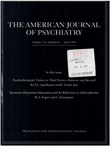Psychotherapy of dysthymia
Publication: American Journal of Psychiatry
Abstract
OBJECTIVE: The author reviews empirical research on the psychotherapy of dysthymia. Dysthymia, a prevalent mood disorder, has been shown frequently to respond to antidepressant medication. The need for a treatment for dysthymic subjects unable or unwilling to take, or unresponsive to, medication still remains. METHODS: Studies were located by computerized search and the author's knowledge of the literature. All reports of studies on psychotherapy outcome for dysthymic patients, except studies of late-life chronic major depression, were included. RESULTS: Psychotherapy research on dysthymia has been confined to small, usually uncontrolled studies with varying methods and limited follow-up. Cognitive approaches have been most frequently studied; the results have not been dramatic but do suggest that some dysthymic patients respond to brief cognitive therapies. Preliminary results of an ongoing study of interpersonal psychotherapy are promising. CONCLUSIONS: Given the public health importance of dysthymia and the availability of treatments, the time is ripe for clinical trials of antidysthymic psychotherapy. The author proposes the following guidelines for such trials: time-limited, manual-based psychotherapy, interpersonal focus, serial design, continuation and maintenance treatment, combined treatments, and follow-up assessments.
Get full access to this article
View all available purchase options and get full access to this article.
Information & Authors
Information
Published In
History
Published in print: August 1994
Published online: 1 April 2006

